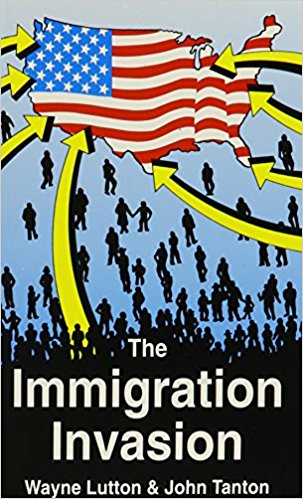Is the current wave of immigration to America, mainly from the Third World, an invasion? Wayne Lutton and John Tanton maintain that it is. The authors effectively argue that our unprecedented level of immigration, forced on the country by selfish interests, is remaking America in many negative ways, especially by eroding our national culture. But are Lutton and Tanton justified in using a term suggestive of violent conquest? After all, the arrival of approximately 1.2 million foreigners each year is mainly peaceful, even if about 300,000 of that total come illegally. But even if “invasion” is not the best word, the authors are correct to imply that the term “immigration,” by itself, does not do justice to our predicament.
Say “immigration,” and the average American will call to mind the image of Emma Lazarus’s “huddled masses,” or maybe an arriving Old World couple viewing the Statue of Liberty for the first time with admiration in their eyes. Schools and the media have carefully planted and cultivated these mental images—sometimes with honest intent and sometimes on behalf of interests that stand to reap power and profit from streams of newcomers. Yet lest we have any misgivings, “immigration,” we are assured, will one day result in assimilation of the immigrants to the American way of life. The image is that of the Melting Pot.
But as Tanton and Lutton show, all trends indicate that the overload of immigrants and their unprecedented diversity are causing a meltdown of the pot: that immigrants are changing America more than America is changing them. If “immigration” is no longer the appropriate word, then what is? One possibility is “colonization.” Though the term may connote military action, it also suggests the idea of a group of people arriving in a land and imposing itself on the inhabitants, even if the process is relatively nonviolent. Many immigrants today are not bashful about flying the colonial colors, and some, like past colonialists, even believe they are rendering a service to the “natives”: a Korean immigrant recently proclaimed in a newspaper column that the mission of his people was to improve the moral climate of American life. Some humility, however, may be in order for this Asian Kipling with his Yellow Man’s Burden. For example, the proliferation of Korean-owned liquor stores in South-Central Los Angeles has made many of the locals restless; they do not appreciate this influence on their moral climate. Other self-proclaimed gift-bearers are those Hispanic immigrants who would offer us the superior “family values” of Latin American culture, even as the Hispanic illegitimacy rate (immigrants and native-born together) considerably exceeds that of the white American majority.
Some immigrants, like many pro-immigration Americans, maintain that newcomers have special vigor and energy that native-born Americans somehow lack. In their view, America, like Count Dracula, needs regular supplies of “new blood” for health and well-being, and particularly for the American economy. Left unexplained is how such countries as Japan, South Korea, and Taiwan get along quite well with their own blood.
Not all colonists, of course, have good intentions, or even claim to have them. Many Mexican immigrants make it plain that they are coming to recover California and the other “lost territories” of Mexico. Once here, they hope to reinforce their claim to these lands through high birthrates generously subsidized, as Tanton and Lutton point out, with taxes from the rest of us. Particularly troubling is a group called MEChA, based on a number of campuses in California and other states. With the help of unchecked immigration, it advocates ethnic cleansing to rid the American Southwest of all non-Hispanics. Admittedly, MEChA is a fringe organization, but even the mainstream of the pro-immigrant movement seems to view the frontier between the United States and Mexico as hardly more significant than the state line between California and Nevada.
In October, illegal aliens and their American supporters organized a mass rally and march of 70,000 people in Los Angeles to affirm the inalienable right of aliens to utilize the tax monies paid by American citizens; large numbers carried Mexican flags. Though Tanton and Lutton may exaggerate by using the term “invasion,” in another sense they understate the problem. An invaded country may hope that the invader will depart some day, leaving it to return to normal. Once Hitler’s troops left France, the country went back to being French. But foreign populations, as opposed to foreign armies, are another matter. Can Miami and Los Angeles ever become American cities again?
[The Immigration Invasion, by Wayne Lutton and John Tanton Petoskey (Michigan: The Social Contract Press) 192 pp., $4.95]



Leave a Reply